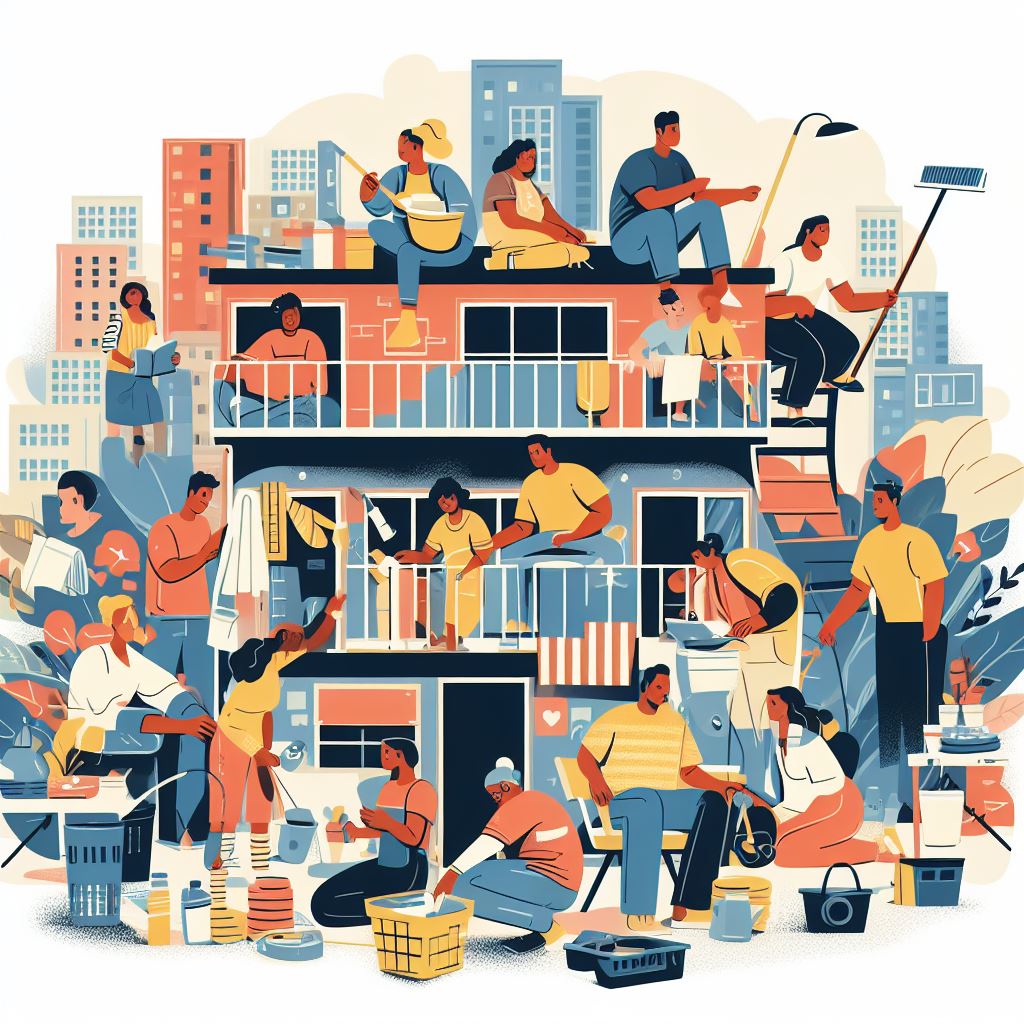14 Essential Duties of Renters in Subsidized Housing

Are you a renter in subsidized housing? Discover the 14 essential duties that you, as a tenant, should fulfill.
From paying rent on time to reporting maintenance issues, this article highlights the key responsibilities you have in keeping the property clean and adhering to the lease agreement.
Respect your neighbors and community rules, dispose of trash properly, and refrain from illegal activities.
By following these duties, you can ensure a harmonious living environment for yourself and others.
Key Takeaways
- Paying rent on time and reporting maintenance issues promptly are crucial responsibilities for renters in subsidized housing.
- Maintaining cleanliness by developing a cleaning routine, properly maintaining appliances, and removing trash regularly is important.
- Respecting neighbors and community rules includes keeping noise levels low, following parking regulations, and properly disposing of trash.
- Compliance and communication involve notifying the landlord of changes, obtaining renter’s insurance, allowing access for maintenance, and maintaining positive communication with the landlord.
Paying Rent on Time
- You must pay your rent on time in subsidized housing. This is a fundamental responsibility that you have as a tenant. Subsidized housing programs aim to provide affordable housing options to individuals and families who may be in need of assistance. However, these programs rely on timely rent payments to ensure their continued operation and to support the financial stability of the housing providers.
- When you fail to pay your rent on time, it can have serious consequences. It not only affects your own housing stability but also impacts the overall functioning of the subsidized housing program. Late rent payments can strain the resources of the housing provider and make it difficult for them to fulfill their obligations towards other tenants.
- To avoid any complications, it’s crucial that you understand the terms and conditions of your lease agreement. Take note of the due dates and any penalties that may be imposed for late payments. It’s your responsibility to manage your finances effectively and prioritize your rent payment to ensure that it’s made on time.
- If you anticipate any difficulties in paying your rent on time, it’s essential to communicate with your housing provider as soon as possible. They may be able to offer you alternative payment arrangements or connect you with resources that can help you meet your financial obligations.
- Paying your rent on time isn’t only a requirement in subsidized housing but also a good practice for maintaining a positive relationship with your housing provider. It demonstrates your commitment to fulfilling your responsibilities and contributes to the overall stability and success of the subsidized housing program.
Reporting Maintenance Issues
When living in subsidized housing, it’s essential for you to promptly report any maintenance issues that arise. By reporting these issues in a timely manner, you help ensure that necessary repairs and maintenance tasks are addressed promptly.
Clear communication methods, such as submitting maintenance requests through a designated system or contacting the property management office directly, should be utilized to ensure that your maintenance issues are properly documented and addressed.
Timely Maintenance Reporting
To effectively fulfill your responsibilities as a renter in subsidized housing, it’s crucial to promptly report any maintenance issues that arise.
Timely maintenance reporting is essential for ensuring that necessary repairs are addressed promptly, minimizing the risk of further damage or inconvenience.
When you notice a maintenance issue, such as a leaking faucet, a malfunctioning electrical outlet, or a broken window, it’s your duty to inform the property management or maintenance staff as soon as possible.
Provide them with accurate and detailed information about the problem, including the specific location and any relevant details.
This will enable them to assess the situation efficiently and take appropriate action.
Clear Communication Methods
For effective reporting of maintenance issues in subsidized housing, it’s important to communicate clearly and directly with the property management or maintenance staff.
Clear communication methods ensure that your concerns are understood accurately and can be addressed promptly.
When reporting maintenance problems, provide specific details about the issue, such as the location, nature of the problem, and any relevant information that may help in resolving it.
Be concise and straightforward in your description, avoiding unnecessary elaboration.
Use polite and respectful language to convey your concerns, as this encourages a positive and cooperative relationship with the management or maintenance staff.
By communicating clearly, you can help ensure that your maintenance issues are resolved efficiently and effectively.
This leads to greater accountability for repairs and contributes to a well-maintained living environment for all residents.
Accountability for Repairs
To ensure accountability for repairs in subsidized housing, you must promptly report any maintenance issues you encounter. By promptly reporting issues, you not only protect your own well-being and comfort, but also contribute to the overall maintenance and improvement of the housing community. When reporting maintenance issues, it is important to provide detailed and accurate information to assist the housing management in addressing the problem effectively. This can be done by describing the issue, specifying the location, and providing any relevant photographs or evidence. Remember to document the date and time of the report, as well as any follow-up communication or actions taken by the management. By being proactive in reporting maintenance issues, you help create a safe and well-maintained living environment for yourself and your fellow tenants.
| Reporting Maintenance Issues | |
|---|---|
| Describe the issue | Provide location |
| Include photographs | Document the date |
| Communicate follow-up actions |
Keeping the Property Clean and Well-Maintained
As a renter in subsidized housing, it’s important for you to take responsibility for keeping the property clean and well-maintained. This includes reporting any maintenance issues promptly, ensuring proper waste disposal, and fulfilling regular cleaning responsibilities.
Reporting Maintenance Issues
How often should you report maintenance issues in subsidized housing?
It’s crucial to promptly report any maintenance issues that arise in your subsidized housing unit. By reporting these issues in a timely manner, you contribute to the overall cleanliness and well-maintained condition of the property. Ignoring or postponing the reporting of maintenance problems can lead to further damage and inconvenience for yourself and other residents.
It’s recommended that you report maintenance issues as soon as you become aware of them, regardless of their severity. This allows the property management to address the problems promptly and prevent them from escalating.
Proper Waste Disposal
Keep the property clean and well-maintained by properly disposing of waste. Here are four essential steps to ensure proper waste disposal in subsidized housing:
- Separate recyclables: Sort your waste into different containers for recycling and non-recyclable materials. This helps minimize environmental impact and promotes sustainability.
- Use designated bins: Dispose of your waste in the designated bins provided by the housing management. These bins are specifically designed to handle different types of waste, such as general trash, paper, plastic, and glass.
- Follow waste disposal guidelines: Familiarize yourself with the waste disposal guidelines provided by the housing management. This includes knowing which items are accepted or prohibited for disposal, as well as any specific instructions for hazardous waste.
- Keep common areas clean: Take responsibility for maintaining cleanliness in common areas by promptly disposing of any waste you come across. This contributes to a pleasant living environment for everyone in the subsidized housing community.
Regular Cleaning Responsibilities
To fulfill your regular cleaning responsibilities and maintain the cleanliness and upkeep of the property, it’s important to prioritize cleanliness in your day-to-day activities.
Regular cleaning is essential to ensure a healthy and comfortable living environment for yourself and your neighbors. Start by developing a cleaning routine that includes tasks such as sweeping and mopping the floors, dusting surfaces, cleaning windows, and sanitizing common areas.
It’s also crucial to properly maintain appliances and fixtures, such as regularly cleaning the stove, refrigerator, and bathroom fixtures. Pay attention to details, like removing trash and recycling regularly, and keeping personal belongings organized and stored away.
Adhering to Lease Agreement Terms
Are you fully aware of the terms of your lease agreement for subsidized housing? Adhering to the terms of your lease agreement is vital to maintaining a positive and successful tenancy.
Here are some essential duties you need to fulfill:
- Paying Rent on Time: Timely rent payment is crucial to ensure smooth financial operations and maintain a good relationship with your landlord.
- Reporting Maintenance Issues: It’s your responsibility to promptly report any maintenance issues to your landlord or property management. This helps in ensuring that necessary repairs are carried out in a timely manner.
- Respecting Property and Neighbors: It’s important to respect the property you’re renting and the neighbors around you. This includes keeping noise levels down, properly disposing of trash, and not causing damage to the property.
- Following Community Guidelines: Many subsidized housing communities have specific guidelines in place that you must adhere to. These may include rules regarding pets, parking, or common area usage. Familiarize yourself with these guidelines and follow them accordingly.
Respecting Neighbors and Community Rules
Respect your neighbors and abide by community rules to maintain a harmonious living environment in subsidized housing. Living in a community means sharing spaces and resources with others, and it is crucial to be considerate and respectful of your neighbors. By following community rules, you contribute to a positive atmosphere and ensure that everyone’s needs are met.
One way to respect your neighbors is by keeping noise levels to a minimum. Excessive noise can disrupt others’ peace and quiet, so it is important to be mindful of your volume, especially during late hours. Additionally, being mindful of shared spaces, such as hallways and common areas, is essential. Keeping these areas clean and uncluttered allows for easy access and a pleasant environment for everyone.
Community rules play a vital role in maintaining order and fairness. These rules may include guidelines for parking, trash disposal, and pet regulations. By adhering to these rules, you contribute to a sense of unity and cooperation within the community.
To further illustrate the importance of respecting neighbors and abiding by community rules, refer to the table below:
| Respectful Behavior |
|---|
| Keep noise levels low |
| Clean up after yourself |
| Follow parking regulations |
| Dispose of trash properly |
| Respect pet policies |
| Be considerate of shared spaces |
Notifying Landlord of Changes in Income or Household Composition
When living in subsidized housing, it’s crucial for you to inform your landlord promptly about any changes in your income or household composition. Keeping your landlord informed about changes in your income ensures that your rent is accurately calculated based on your current financial situation.
Similarly, notifying your landlord about any changes in your household composition allows them to update their records and make any necessary adjustments to your lease agreement.
Timely Income Updates
Make sure to promptly inform your landlord of any changes in your income or household composition. Timely updates regarding your income and household composition are essential in maintaining the integrity of your subsidized housing arrangement. By promptly notifying your landlord of any changes, you can ensure that your rent is accurately calculated based on your current financial situation.
Here are four reasons why timely income updates are crucial:
- Accurate rent calculation: Informing your landlord of changes in your income allows them to adjust your rent based on your current financial circumstances.
- Compliance with program requirements: Subsidized housing programs often require tenants to report any changes in income or household composition promptly.
- Avoidance of overpayment or underpayment: Keeping your income information up-to-date prevents you from paying more or less rent than you should be.
- Transparency and accountability: By providing updated income information, you demonstrate your commitment to maintaining transparency and complying with program rules.
Household Composition Changes
To ensure the accuracy of your rent calculation and comply with program requirements, promptly notify your landlord of any changes in your household composition or income. This is essential in maintaining the integrity of the subsidized housing program and avoiding potential issues in the future. Household composition changes can include additions or removals of family members, such as birth, marriage, divorce, or the departure of a household member. It is crucial to inform your landlord about these changes as they may affect your eligibility for subsidized housing. Additionally, changes in income, whether it be an increase or decrease, should also be reported to your landlord. This will ensure that your rent is accurately calculated based on your current financial situation. Notifying your landlord of these changes in a timely manner will help prevent any potential discrepancies or overpayments.
| Household Composition Changes | Examples | Importance |
|---|---|---|
| Adding a family member | Birth, marriage | Maintain eligibility |
| Removing a family member | Divorce, departure | Maintain eligibility |
| Change in income | Increase, decrease | Accurate rent calculation |
Informing Landlord of Extended Absences
Before leaving for an extended absence, inform your landlord of the duration and reason for your absence. This is an essential duty of renters in subsidized housing, as it allows the landlord to be aware of your plans and make necessary arrangements. Here are four reasons why informing your landlord is important:
- Maintain a good relationship: By informing your landlord of your extended absence, you demonstrate responsible behavior and open communication. This helps build trust and maintain a positive relationship with your landlord.
- Ensure property safety: When you inform your landlord of your absence, they can take necessary security measures to protect the property. This might include arranging for regular checks, implementing additional security measures, or notifying neighbors to keep an eye on the property.
- Compliance with lease agreement: Many lease agreements require tenants to inform the landlord of any extended absence. By complying with this requirement, you avoid potential conflicts and ensure you’re fulfilling your contractual obligations.
- Avoid lease violations: Some subsidized housing programs have specific rules regarding extended absences. By informing your landlord, you can avoid any unintentional violations of program rules and maintain your eligibility for subsidized housing.
Complying With Health and Safety Regulations
To comply with health and safety regulations, ensure you’re aware of and follow the guidelines set forth by your subsidized housing program. These regulations are put in place to protect the well-being of all residents and maintain a safe living environment. It’s essential to understand and abide by these rules to avoid potential hazards and maintain the quality of your subsidized housing unit.
First and foremost, familiarize yourself with the specific health and safety regulations outlined by your program. These guidelines may cover various aspects, such as fire safety, pest control, waste management, and general cleanliness. Take the time to review any documentation provided and ask your landlord or housing authority for clarification if needed.
Next, make sure to promptly report any maintenance or safety concerns to your landlord or housing authority. This includes issues like faulty electrical wiring, plumbing leaks, broken windows, or damaged locks. By reporting these problems, you contribute to maintaining a safe and habitable environment for yourself and your fellow residents.
Furthermore, it’s crucial to maintain cleanliness and proper hygiene within your unit. Keep your living space tidy, dispose of waste appropriately, and refrain from engaging in activities that may compromise the safety of yourself and others. Adhering to these practices helps prevent the spread of illness, pests, and other potential hazards.
Obtaining Renter’s Insurance
Ensure you acquire renter’s insurance to protect your belongings in subsidized housing.
Renter’s insurance is an essential safeguard for tenants in subsidized housing. It provides financial protection in the event of theft, fire, or other unforeseen circumstances. Here are four important reasons why obtaining renter’s insurance is crucial:
- Protect your personal belongings: Renter’s insurance covers the cost of replacing or repairing your belongings if they’re damaged or stolen. This includes furniture, electronics, clothing, and other personal items. Without insurance, you may struggle to replace these items on your own.
- Liability coverage: Renter’s insurance not only protects your belongings but also provides liability coverage. This means that if someone is injured in your apartment, your insurance can help cover their medical expenses and protect you from potential lawsuits.
- Temporary housing assistance: In the unfortunate event that your subsidized housing becomes uninhabitable due to fire or other damage, renter’s insurance can cover the cost of temporary housing. This ensures that you have a place to stay while your apartment is being repaired.
- Peace of mind: Having renter’s insurance gives you peace of mind knowing that your belongings are protected. It allows you to focus on other aspects of your life without worrying about the financial burden of replacing your possessions.
Seeking Approval for Modifications or Repairs
You should regularly communicate with your landlord to seek approval for modifications or repairs in your subsidized housing. It is important to maintain a good relationship with your landlord and follow the rules and regulations set forth in your lease agreement. Seeking approval for modifications or repairs ensures that you are not violating any terms of your lease and helps to maintain the integrity of the property.
When seeking approval for modifications or repairs, it is essential to clearly communicate your intentions and provide any necessary documentation or plans. This helps your landlord understand the scope of the project and make an informed decision. By seeking approval, you also protect yourself from potential liability and ensure that any modifications or repairs are done correctly and safely.
To make the process smoother, here is a table that outlines the steps you can take to seek approval for modifications or repairs:
| Step | Action |
|---|---|
| 1 | Identify the modification or repair needed |
| 2 | Research any applicable regulations or restrictions |
| 3 | Document and communicate your request to your landlord |
| 4 | Provide necessary documentation or plans |
| 5 | Await approval from your landlord before proceeding |
Following these steps will help you navigate the process of seeking approval for modifications or repairs in your subsidized housing. Remember, open communication and adherence to the rules set forth in your lease agreement are key to maintaining a positive living environment.
Properly Disposing of Trash and Recycling
When living in subsidized housing, it’s essential that you adhere to recycling guidelines and rules set by your housing provider.
Properly disposing of trash and recycling not only helps maintain a clean and sanitary living environment, but it also ensures that valuable resources are recycled and not wasted.
Recycling Guidelines and Rules
To properly dispose of trash and recycling in subsidized housing, residents must follow the recycling guidelines and rules. Here are the guidelines and rules to ensure proper disposal:
- Separate recyclables: Sort your recyclables into different bins to facilitate the recycling process. Common items include paper, cardboard, plastic bottles, glass, and aluminum cans.
- Rinse containers: Before recycling, rinse containers to remove any leftover food or liquid. This helps prevent contamination and ensures the recycling process is more efficient.
- Flatten cardboard boxes: Flatten cardboard boxes before placing them in the recycling bin. This saves space and allows for easier transportation.
- Follow local regulations: Familiarize yourself with the recycling regulations specific to your area. Some municipalities have specific guidelines for recycling, such as restrictions on certain types of plastics or requirements for sorting materials.
Trash Disposal Responsibilities
Properly disposing of trash and recycling is an essential responsibility for renters in subsidized housing. As a renter, it’s crucial to follow the guidelines and rules set by the housing management regarding trash disposal. These guidelines are put in place to ensure a clean and safe living environment for all residents.
When it comes to trash disposal, you should separate your waste into different categories, such as general waste, recyclables, and hazardous materials. Make sure to use the provided bins or designated areas for each type of waste. Additionally, it’s important to properly bag your trash to prevent any leaks or spills that could attract pests or create unpleasant odors.
By following these trash disposal responsibilities, you contribute to the overall cleanliness and well-being of the subsidized housing community.
Transition: Understanding the importance of proper disposal is key to maintaining a healthy and sustainable living environment.
Importance of Proper Disposal
By understanding the importance of proper disposal, you can actively contribute to maintaining a healthy and sustainable living environment in subsidized housing. Here are four reasons why proper disposal is crucial:
- Prevent Health Hazards: Properly disposing of trash and recycling helps prevent the spread of diseases and pests. Accumulated trash can attract rodents and insects, posing health risks to residents.
- Promote Cleanliness: Proper disposal ensures that common areas and individual living spaces remain clean and hygienic. This contributes to a pleasant living environment for everyone in the subsidized housing community.
- Environmental Preservation: Properly disposing of recyclable materials reduces waste and conserves natural resources. Recycling also helps mitigate pollution and supports sustainable practices.
- Compliance with Regulations: Following proper disposal guidelines ensures that subsidized housing communities remain in compliance with local regulations. This helps avoid penalties and maintain the integrity of the housing program.
Refraining From Illegal Activities
You must refrain from engaging in any illegal activities while residing in subsidized housing. As a renter in subsidized housing, it’s your responsibility to abide by the law and maintain a safe and secure living environment for yourself and your neighbors. Engaging in illegal activities not only puts your housing at risk but also affects the overall well-being of the community.
Illegal activities include but aren’t limited to drug use, drug trafficking, theft, vandalism, and any form of violence. These activities not only violate the terms of your lease agreement but also pose a threat to the safety and security of the entire housing community. It’s crucial to understand that subsidized housing aims to provide a stable and supportive living environment for individuals and families in need. By engaging in illegal activities, you undermine the purpose of subsidized housing and jeopardize the assistance provided to you.
Furthermore, engaging in illegal activities can result in legal consequences, including criminal charges and potential eviction from your subsidized housing unit. It’s essential to remember that as a resident, you have a responsibility to contribute positively to the community and adhere to the rules and regulations set forth by the housing authority.
Allowing Landlord Access for Inspections or Repairs
To ensure the maintenance and safety of the subsidized housing community, it’s important to grant your landlord access for inspections or repairs. By allowing your landlord to access your unit, you’re contributing to the overall well-being of the community and ensuring that any necessary repairs or inspections can be conducted promptly.
Here are four reasons why allowing landlord access is essential:
- Maintenance and Repairs: Granting access allows the landlord to address any maintenance issues promptly. Timely repairs help prevent further damage, ensuring a safe and habitable living environment for all residents.
- Safety Inspections: Landlords may need to conduct safety inspections to ensure that the property meets necessary standards. These inspections may include checking smoke detectors, carbon monoxide detectors, fire extinguishers, and other safety features.
- Preventive Maintenance: Regular inspections can help identify potential issues before they become major problems. This proactive approach can save time and money in the long run, preventing costly repairs and inconveniences.
- Legal Compliance: Landlords have a responsibility to comply with housing regulations and laws. Access allows them to ensure that the property meets all necessary requirements, such as accessibility standards or lead paint regulations.
Granting your landlord access for inspections or repairs is a crucial aspect of being a responsible tenant. It promotes a safe and well-maintained living environment for everyone in the subsidized housing community.
Communicating Openly and Responsibly With Landlord
Maintaining open and responsible communication with your landlord is crucial in ensuring a positive renting experience in subsidized housing. Effective communication can help you address any issues or concerns that may arise during your tenancy, and it can also help foster a good relationship with your landlord. When communicating with your landlord, it’s important to be clear, concise, and respectful.
One way to communicate openly and responsibly with your landlord is to promptly report any maintenance or repair issues that you notice in your unit. Whether it’s a leaky faucet, a broken window, or a malfunctioning appliance, notifying your landlord as soon as possible can help prevent further damage and ensure that the necessary repairs are made in a timely manner.
Another aspect of responsible communication is paying your rent on time and in full. This not only shows your commitment to fulfilling your rental obligations but also allows your landlord to properly manage their finances and maintain the property. If you anticipate any difficulties in paying your rent, it’s important to communicate this with your landlord in advance so that alternative arrangements can be made if necessary.
Lastly, if you have any concerns or issues related to your tenancy, it’s important to address them with your landlord in a respectful and constructive manner. Clearly articulating your concerns and providing any necessary documentation or evidence can help facilitate a resolution and ensure that your rights as a tenant are upheld.
Frequently Asked Questions
Can I Have a Pet in Subsidized Housing?
Yes, you can have a pet in subsidized housing. However, there may be certain restrictions and guidelines to follow. It is important to review your lease agreement and communicate with your landlord regarding any pet policies.
Can I Sublet My Subsidized Housing Unit?
Yes, you can sublet your subsidized housing unit. However, it is important to remember that you are still responsible for ensuring that the subletter follows all the rules and responsibilities of the lease agreement.
What Happens if I Can’t Afford to Pay My Rent on Time?
If you can’t afford to pay your rent on time in subsidized housing, you may face consequences such as late fees, eviction notices, or even termination of your lease. It is important to communicate with your landlord and explore available resources for financial assistance.
Can I Make Modifications to My Subsidized Housing Unit?
Yes, you can make modifications to your subsidized housing unit, but you must follow certain guidelines and obtain permission from the housing authority. Failure to do so may result in penalties or eviction.
What Happens if I Violate Community Rules or Engage in Illegal Activities?
If you violate community rules or engage in illegal activities in subsidized housing, you may face consequences such as warnings, fines, eviction, or even legal action. It is important to abide by the rules to maintain your housing assistance.



